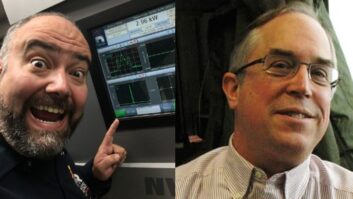Update to the sidebar story below: Judge Leonard P. Stark on Nov. 14 issued a stay in the U.S. District Court case.
A U.S. Patent and Trademark patent examiner recently rejected many of the key claims made by Mission Abstract Data that lie at the heart of the patent dispute involving hard-disk automation systems.
Many observers figured the decision, as reported in October in RW, would bolster the defense of the broadcasters named in an associated federal lawsuit.
In an “office action” — a letter from a trademark examining attorney setting forth the legal status of a trademark application — PTO Examiner Jason Proctor overturned 15 of the 29 challenged claims in the first patent and five of the 10 claims in the second.
Overall, broadcast industry sources reacted positively to the new developments. However at least one patent attorney believes the patent reexamination and litigation will continue.
Bill Ragland, a patent attorney with Womble Carlyle Sandridge & Rice, said Mission Abstract Data has several appeals remaining and that they could take years to exhaust.
Mission Abstract Data had until early December to respond to the decision by the patent examiner to overturn several of the claims. Pending any changes, the response period would end Dec. 6.
Patent Holder Targets Smaller Stations
WILMINGTON, Del.As several large broadcast groups face down Mission Abstract Data and its patent infringement lawsuit in U.S. District Court in Delaware, some small and standalone station owners have received letters urging them to sign one-time license agreements with the company.
Mission Abstract Data sued in U.S. District Court for the District of Delaware in March 2011, alleging patent infringement by broadcast groups including CBS Radio, Beasley Broadcasting, Cox Radio, Greater Media and Cumulus. A hearing on a stay request by the defendants was held in late October. The presiding judge was still considering the stay request in early November. [A stay subsequently was issued on Nov. 14. Ed.]
Separately, Mission Abstract Data has continued to attempt to license and collect fees from other stations, citing the two patents.
Some of those broadcasters agreed to discuss the correspondence on the condition of anonymity, preferring to stay out of the “cross hairs of Mission Abstract Data,” as one general manager described it.
Some small and standalone station owners have received letters urging them to sign one-time license agreements. A rate chart was included with the introductory letter.

Mission Abstract Data sent letters to some broadcasters in spring. A second and a third round were sent in late summer and early fall.
Just how the company is deciding which stations to contact is unknown, according to one person familiar with the situation, adding that Mission Abstract Data “appears to be picking stations at random and there’sno way of telling how many broadcasters have received the letters” so far.
‘Money grab’
The letter details the patents and asks broadcasters to contact a Mission Abstract Data representative to discuss a “one-time, fully paid-up licensing fee for a non-exclusive, company-wide right” to use Mission Abstract Data’s technology.
RW’s phone calls to the company’s representative, identified in the letter as Michael Davis, were not returned.
A rate chart was included with the introductory letter, according to one person familiar with the correspondence.
“On the advice of our FCC attorney, we acknowledged receipt of the letter in early September and referred the Mission Abstract Data people to contact our Washington attorney,” one station representative said. “To the best of my knowledge [Mission Abstract Data] never followed up. We thought it was odd that they were looking for licensing for us and our small market.”
That station’s community is small, ranked in the 200s. Management was surprised to be targeted and assumed Mission Abstract Data was looking for some quick licensing money. “Looks like they haven’t been able to get agreements with larger markets,” this source said.
An owner of a seven-station cluster in a mid-sized market took a different approach with the letter. “I skimmed it and threw it away. I didn’t spend any extra time or effort on it,” said the general manager, characterizing Mission Abstract Data’s approach as similar to an “extortion letter” and a “money grab.”
Attorney Kevin Goldberg at Fletcher Heald & Hildreth, updating broadcast clients after a U.S. patent examiner overturned some of MAD’s key patent claims, reiterated prior advice:
“Smaller broadcasters who have not been sued would be well-advised to take any communication from MAD seriously, but obviously now it should also be taken with a grain of salt. Anyone contacted by MAD should do their due diligence: Have an attorney thoroughly review any licensing agreement they receive; dig out any potential indemnification clause that might be invoked to require their software provider to cover legal costs and/or damages; and check to see whether their own insurance policies will cover damages if they have no indemnification.”
“There is no doubt that Mission Abstract Data will respond and it is conceivable that the patent examiner could be persuaded by the arguments of the patent holder and change his or her mind to the status of the claim rejection,” Ragland said.
“Even if there is an upholding of the initial rejections, there is the possibility that the patent holder could appeal to the Patent and Trademark Board of Appeals. And then they have the right to appeal that to the U.S. Court of Appeals for the Federal Circuit.
“The case is far from over.”
Process can be lengthy
Examiner’s decisions often are reversed on appeal, Ragland said.
“The appeal process takes a lot of time. The length of time for this case to resolve eventually could be literally three or four years to settle rejected claims.”
The claims Proctor upheld have to do with how music is accessed over a phone network or a cable TV network, and configuration of storage. The claims to application of key concepts such as “standard PC networks with central storage” and “shared audio files database” were rejected.
However, Mission Abstract Data specifically mentions Claim Number 5 of patent 5,629,867 in a letter to some broadcasters urging them to sign license agreements. The examiner upheld Claim 5 in that patent.
“If Claim 5 is the one being asserted and describes something that happens on a widespread basis at radio stations, this still could be a problem for the industry,” said Ragland. “Remember, it only takes one claim of these patents to be infringed to have infringement liability.”
In the claim, Mission Abstract Data states: “wherein said disk array storage comprises a dual-port RAID disk array.” The examiner decided that none of the “prior art” submitted by broadcasting companies supported a rejection of that claim.
While the patent claims may take years to settle, the USPTO did seem to expedite its initial reexamination process, Ragland said. “I would say quicker than normal.”
Broadcast Electronics, a radio automation supplier but not a defendant in the patent infringement lawsuit, had requested the ex-parte patent reexamination earlier this year.
Among the prior art that the patent examiner cited was a manual for an Arrakis Digilink digital audio workstation in 1992, a Dalet manual from that same year and a Dalet advertisement that appeared in Radio World in the fall of 1993.
“The claims that have been rejected by the USPTO are those that define a basic automation system with music on hard drive as is typically used in radio today,” said Arrakis Systems President/CEO Mike Palmer. “The rejection was based on the features of the Arrakis Digilink automation system that was first shown at the April, 1991 NAB show, well before the 1994 patent filing. This is definitely a major win for the entire radio industry, not just those who have been named in the lawsuit.”
Palmer credited Broadcast Electronics with bearing the financial cost of the patent reexamination process.
“They searched out everyone, collected the data and crafted the challenge to the patents. It is a good thing that they were so thorough, as it turned out that Arrakis Digilink was the only indisputable prior art. The industry owes BE a great debt of gratitude for their personal and corporate sacrifice on all of our behalf,” Palmer said.








